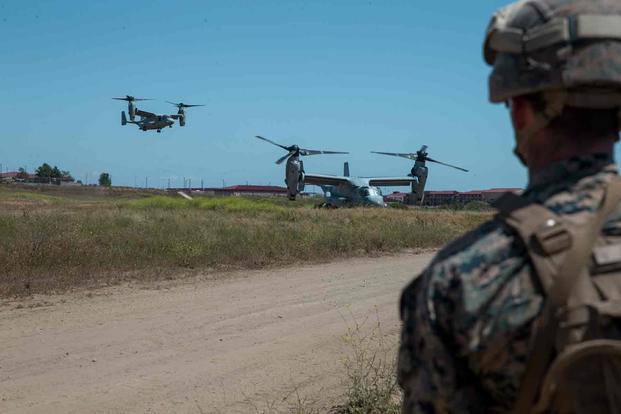More than three years after a civilian skydiving aircraft collided with an MV-22 Osprey sitting on a San Diego runway, the U.S. government is suing several businesses, the airport, city, a pilot and others for damages.
The civil lawsuit, filed by the U.S. government late last month in U.S. District Court in Southern California, is seeking upward of $5.7 million for the Class A Mishap -- the term the military uses for its most expensive or deadly crashes -- which occurred on May 30, 2020, at Brown Field Municipal Airport in San Diego, California.
The lawsuit, filed on behalf of the Department of the Navy, names the civilian pilot, Christopher Sanders; Tac Air Ops LLC, a veteran-owned business that helps train the military; Kapowsin Air Sports LTD, a skydiving company; the City of San Diego; Brown Field Municipal Airport; and 25 other individuals who are unnamed in the lawsuit.
Read Next: Air Force to Its Experienced Pilots: Here's $50,000 to Extend Your Service
"Defendants are indebted to the United States for the value of the repair and transportation costs of the MV-22," the lawsuit states.
Between May 29, 2020, and May 31, 2020, the Marine Corps' Marine Medium Tiltrotor Squadron 163 ordered two MV-22 aircraft to fly from Air Station Miramar to Brown Field, about 30 miles away, to conduct routine training flights, the lawsuit states.
On May 29, 2020, a VMM-163 Osprey aircraft under the call sign "Evil Eye 11" landed at the airport just before midnight and began heading to its usual parking spot, but had to relocate to another area.
"Upon arrival at the routine parking location, the crew of the MV-22 discovered that the airport failed to maintain adequate parking at its routine parking location, and the crew was forced to locate an alternate area to park the aircraft," the lawsuit says.
They had to park in a new spot next to several other aircraft, including a de Havilland DHC-6-100 Twin Otter aircraft. The plane was owned by Kapowsin and operated by Skydive San Diego, which is doing business as Tac Air Ops, the U.S. government said in the lawsuit.
The next morning, on May 30, Sanders, the pilot of the Twin Otter, entered the plane and "powered the right engine to 100% and the left engine to 50%." The plane then collided with the Osprey, according to the lawsuit.
"After traveling more than 80 feet and turning 95 degrees to the left, the Twin Otter impacted the MV-22," the lawsuit states. "The damage to the MV-22 included, but was not limited to, the left proprotor, the left nacelle and engine, the nose wheel, the wing, and the right proprotor blade of the MV-22."
No injuries were reported from the incident, according to a Navy Safety Command report.
Meanwhile, the City of San Diego and Brown Field Municipal Airport are being called out for the parking situation in the government's lawsuit.
"The municipal defendants negligently caused the overcrowding and mismanagement of the airport's facilities, which prevented the United States from the use and enjoyment of its rights to use the airport," the lawsuit states. "The lack of ground support and oversight during the night of May 29, 2020, caused the United States to be exposed to heavily congested and poorly managed aircraft parking areas, which was the direct, proximate, and legal cause of the damages incurred by the United States."
Richard Jackoway, a spokesman for the San Diego City Attorney's Office, declined to comment.
"We have no comment on this pending litigation," Jackoway said in an email.
An owner for Skydive Kapowsin reached by phone also declined to comment. Tac Air Ops LLC did not immediately respond to numerous phone calls and emails asking about the lawsuit.
Sanders did not respond to a Military.com phone call and text messages left at a number associated with him as well as a relative.
The U.S. government is seeking damages "in the amount of at least $5,745,117.83," according to the lawsuit.
The news of the civil lawsuit, first reported by Seamus Hughes of Court Watch, comes amid two deadly crashes last year, most recently in June 2022, and concerning maintenance issues with the U.S. military's Osprey fleet.
-- Thomas Novelly can be reached at thomas.novelly@military.com. Follow him on Twitter @TomNovelly.
Related: Military Quietly Stops Buying Ospreys as Aircraft Faces an Uncertain Future














